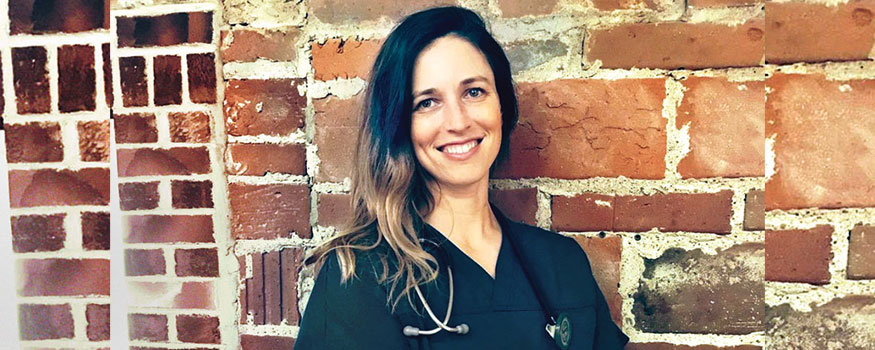By: Christopher Bared
Last year, in the Oct. 3, 2019, edition of UMTV’s NewsVision show, Dr. Sarah Fraser appeared as the guest medical expert.
A graduate student in the University of Miami School of Communication, she had pressed pause on her medical career to pursue a master’s degree in journalism. On the student media cable show, she eloquently explained the dangers of the common flu and debunked a lot of misinformation about the influenza virus.
Months later and in the middle of her second semester in Miami, Fraser picked up her white coat and stethoscope, flew back to her native Canada, and began to fight against a different deadly virus—the novel coronavirus, or COVID-19.
“It was almost inconceivable that I would not be working right now,” Fraser said. “It’s a difficult time to be working, but also it’s a time that I feel like you can really have an impact.”
When she began working in the COVID-19 unit at St. Martha’s Regional Hospital in Nova Scotia on April 7, Fraser was already a seasoned veteran on the medical front. For many years, she worked as a general practitioner focused on sexual health, addiction medicine, and hospitalist medicine. In 2009, she worked in Honduras during the coup against then-president Manuel Zelaya, and she also worked on a few occasions in tuberculosis hospitals in Guatemala. So, working in the COVID unit was not her first bout against a vicious illness. It is, however, her first time fighting a medical war on two fronts—the medical front and the information front.
When she’s not busy saving lives in the hospital, Fraser focuses on sharing accurate and easily digestible information online about important health issues. These days, that means coronavirus. Her journalism degree and her medical expertise now work hand in glove toward her main goal—to increase public understanding about health.
Although her studies on the Coral Gables campus have been interrupted by a global pandemic, Fraser said her time at the University has helped her step up as a journalist.
“Before, my website was very basic. It looked like it wasn’t professionally done, the colors were wrong, and the organization was just horrible,” Fraser said.
After a semester of writing, digital journalism, and videography courses, Fraser said she feels proud of SarahFraserMD.com, where she shares her medical writings.
It was mainly an interest in writing, especially writing about health, which drove Fraser to pursue a fourth academic degree—in journalism.
“My training has always been in the sciences, so I wanted to formalize that interest in writing and use that to make a positive impact,” she said.
Fraser’s academic pursuits have always been tethered to the idea of having a positive impact on the world. As part of her undergraduate degree in biology, she studied seaweed and sea turtles. Later, for her graduate degree in environmental science, she helped replenish the wild population of an endangered, carnivorous bird, called the Loggerhead Shrike. It wasn’t until much later, when two new letters had been attributed to Dr. Fraser’s title, that she realized how she could use writing to have a positive impact.
After medical school, Fraser had a mentor, Dr. Ron Stewart, the former health minister of Nova Scotia.
“He told me I might be able to make even more of a difference with my writing than I could as a doctor,” Fraser said.
The comment was not a slight to her medical adeptness. It was a compliment to her ability to coordinate the left hemisphere of her brain—the logical, scientific side—with the right hemisphere—the creative, artistic side. Fraser started to work at the crossroads of art and science and even produced genre-bending content.
In 2014, she compiled and self-published a collection of what she calls medical poetry, which she had written as a student.
“The poems reflect on experiences I had with patients and the need for more compassion in medicine,” Fraser said.
Her book, “Humanity Emergency,” drew attention from other medical communicators, including Dr. Brian Goldman, host of a medical-themed CBC Radio show, who described Fraser’s book as “evidence of a lively mind that even medicine cannot destroy.”
That lively mind stayed hard at work. “Humanity Emergency” was just step one in Fraser’s plan to become an expert health communicator and multifaceted doctor. At the University of Miami, she started developing a broad range of skills that would help her grow her brand.
“I’m getting so many more requests for interviews because my website is really professional now,” Fraser said.
Fraser also said she wants to become a medical journal editor, start a podcast, and eventually produce a health-related documentary. At this moment, however, she’s focused on what is in front of her, which is a lot of uncertainty about the outcome of the current pandemic.
“I think the most challenging thing is the fear of the unknown and not knowing if we’re [Nova Scotia] going to be hit as hard as, for example, New York or Italy,” Fraser said.
As a doctor, Fraser is also concerned about her own health.
“From a physical standpoint, I pretend I have the virus and I pretend that everyone else does, and I pretend that everything has virus on it,” she explained.
But as a journalist, she is concerned with spreading real information, and, most importantly she has a firsthand, eyewitness account of life as a doctor fighting a pandemic.







